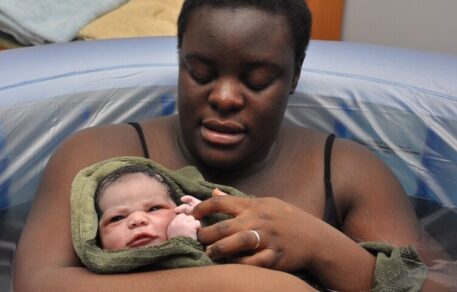For uncomplicated pregnancies, water births with NHS midwives present are as safe as giving birth out of water for both women and their babies, new research has shown.
Researchers at the University of Cardiff set out to establish if water births, where an NHS midwife is present, are as safe as exiting the birthing pool and giving birth out of water amid healthcare workers’ concerns over waterbirth safety.
Related Article: Mothers with anaemia more likely to have a baby with congenital heart disease
Analysing the birth experience of over 87,000 women, the researchers found that rates of harm to the mother or the baby were similar whether birthing took place in or out of the water.
The researchers say the findings known as the POOL study and published in BJOG, the research journal of the Royal College of Obstetricians and Gynaecologists, will have implications for thousands of women worldwide as immersion in water during labour is becoming more common practice.
In the UK, around 60,000 women a year use a birth pool or bath for pain relief since warm water immersion during labour provides analgesia and comfort. However, some midwives and doctors remain concerned that waterbirths could carry extra risks, such as illness or death for the baby and heavy blood loss or tearing for the mother.
The researchers studied NHS records from 87,040 women across 26 NHS organisations in England and Wales. All the participants had opted to use a pool in labour between 2015 and 2022. The researchers examined the rates of severe tears experienced by women and rates of antibiotic use, breathing difficulties and death amongst babies of those who birthed in water, compared to those who birthed out of water.
Related Article: ‘Potential’ introduction of chickenpox vaccine in early 2026
The researchers found that around half of all women who used a pool in labour had a waterbirth. Of the women who birthed in water, approximately one in 20 first time mothers had a severe tear. This was reduced to one in 100 for women who were already mothers.
Baby deaths were also very rare among women who chose to stay in the water to give birth. Around three in every 100 babies born in the water needed antibiotics or help with their breathing in a neonatal unit. The rates of these complications were found to be similar whether birth had taken place in the water or just after exiting the water.
Julia Sanders, a Professor of Clinical Midwifery at Cardiff University who led the research team, said: ‘Midwives are often asked by mothers if they should stay in or leave the water to give birth if labour remains uncomplicated. Our research was able to scientifically establish that giving birth in water was not associated with an increase in risk for mother and baby. We have been able to provide information that can empower and support mothers and midwives when making decisions during labour.’
Related Article: ‘Sustained effort’ required to bring child vaccination rates to 95% target
Professor Chris Gale, a consultant neonatologist at Chelsea and Westminster NHS Foundation Trust in London, who was involved in the study, added: ‘Many paediatricians and neonatologists worry that births in water might carry extra risks for babies, but the study found convincing evidence that for women with an uncomplicated pregnancy, this is not the case.’






